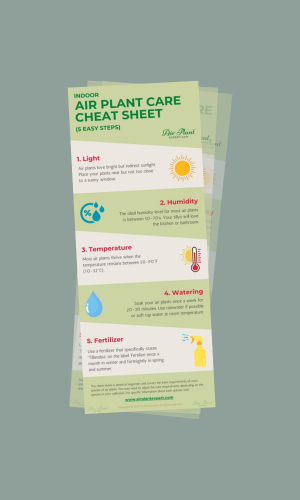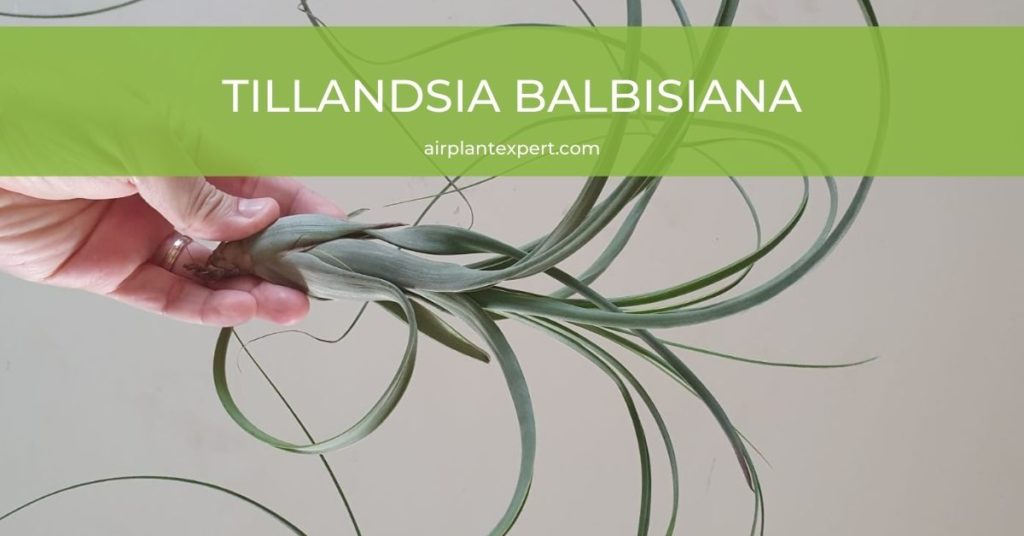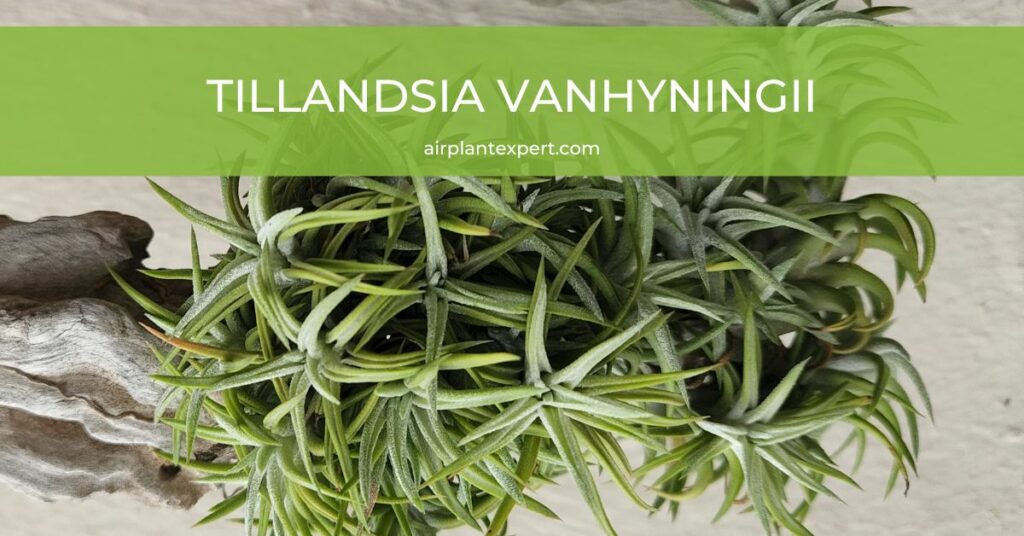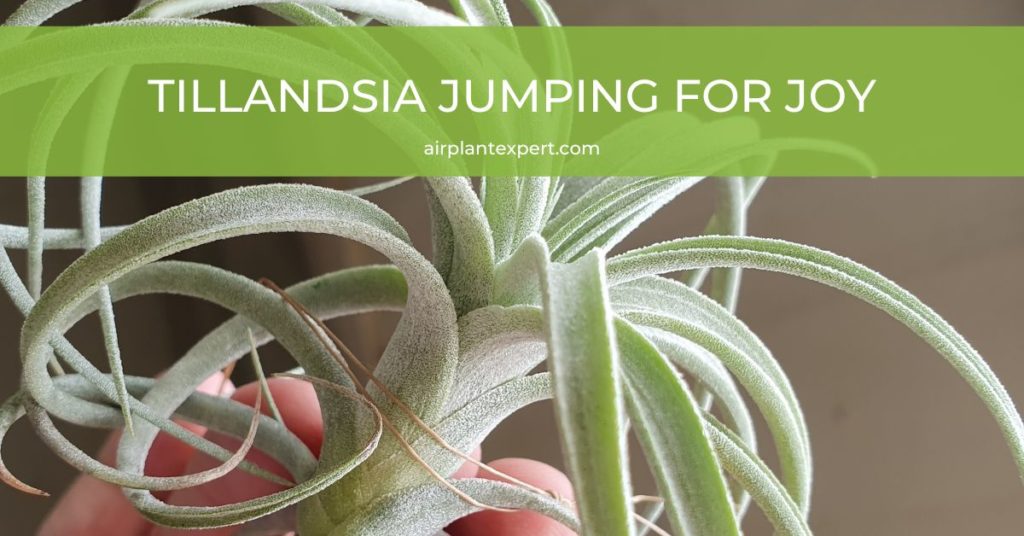Commonly known as the Inflated Wild Pine or Northern Needleleaf, Tillandsia Balbisiana is a bulb-like air plant, boasting a bulbous and round base. This resilient air plant has leathery leaves, gracefully extending outwards from its center.
Quick Guide
How to Care for Tillandsia Balbisiana
Tillandsia Balbisiana’s care routine is typical of many air plants. This species is usually found on forest tree branches in areas of high humidity so supplemental misting can help your plant to flourish.
Its long, channeled leaf blades recurve and twist, enabling the plant to catch more atmospheric moisture. The leaves are a wonder lettuce green color. As the plant matures, the leaves eventually turn and hang downwards, creating a striking tangle of curled leaves.
When grown indoors, make sure your plant receives good airflow. Balbisiana is resilient to lower temperatures when kept outdoors but it’s important to note that it’s susceptible to frost.
The curved blades add an elegant touch when the plant is hung from rope or wire. It also looks rather striking when mounted on cork wood. Avoid covering the base of this species with moss though as it’s susceptible to rotting from the base upwards.
When hanging this species, you’ll need a strong support beam as Balbisiana can grow large and will eventually become quite heavy.
How to Water Tillandsia Balbisiana
Tillandsia Balbisiana has thick-skinned leaves with a remarkable water-absorbing capacity. In a humid setting, watering/soaking once a week is sufficient. However, if your plant is exposed to intense sunlight or high temperatures, I recommend you also mist every 2-3 days.
Be careful when watering this bulbous plant, water can get trapped in its base, leading to the plant rotting. Make sure you shake off excess water after soaking otherwise your Balbisiana may start rotting within a matter of weeks.
I like to use rainwater, but you can use a soft tap too. I often use pond water as well because it contains a good level of nutrients. Tap water should be left to stand for several days before watering your plants so the chlorine has time to dissipate.
Use lukewarm water, otherwise you may shock your plants.
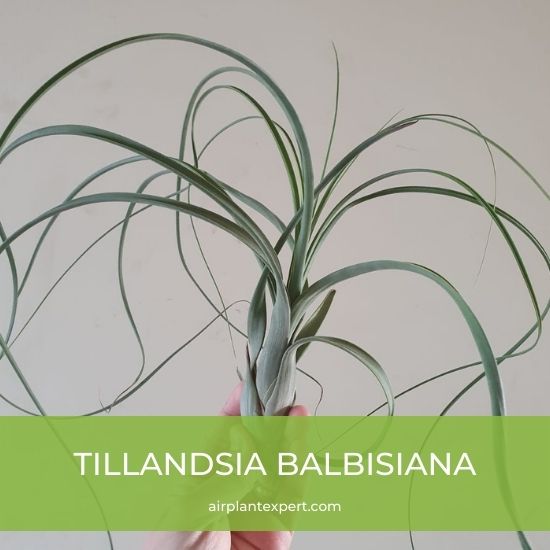
How to Propagate Tillandsia Balbisiana
When propagating Tillandsia Balbisiana you have two primary routes, detaching offsets, also known as pups, or growing new plants from seeds.
Balbisiana produces offsets at its base, which can be separated and grown as individual plants. I recommend waiting until the pups reach approximately one-third the size of the mother plant before carefully detaching them.
This method of propagation will expand your collection quicker than growing from seeds and produce many pups from a single-parent plant.
Gently pull and twist the pups from the parent plant, or use a sharp sterile knife or scissors.
When starting from seeds, patience is key. Seeds require meticulous care and a long time to grow. Spread the seeds thinly on a suitable growing medium such as moss or gravel, and keep them damp in a well-ventilated area. Then wait and watch the magic happen.

Get Your FREE Air Plant Care Cheat Sheet
5 easy steps to keep your air plants happy and healthy.
Flowers and Expert Tips
Tillandsia Balbisiana is renowned for its striking floral display. The exquisite inflorescence has captivating shades of deep red or reddish-yellow bracts. From the bracts blooms 3-4 cm tube-like flowers with deep purple petals.
The vibrant tones of the inflorescence create a striking contrast compared with the pale green lettuce-colored leaves. The inflorescence is often described as blood-red in color.
During the flowering period, it’s essential to provide the right conditions to maximize the plant’s health and visual appeal. Fertilizing every two weeks can help prolong the blooming period, which can range from several weeks to many months.
Position your plant in an area with bright, indirect light. Full sun is often too intense and can damage the delicate flowers.
Remember, once the plant has flowered it will eventually die but usually produces offsets or “pups” before that happens. The pups can be separated and continue the life cycle of your Tillandsia collection.
Tillandsia Balbisiana Hybrids
Tillandsia Balbisiana, commonly referred to as the Northern Needleleaf, is found in many regions including Florida, parts of Mexico, Central America, the West Indies, Colombia, and Venezuela.
With such a wide range it’s not surprising to learn this species has many different names; Inflated Wild Pine, Reflexed Wild Pine, Balbis, Cuttlefish, and even the Coke Bottle.
These are some of my favorite hybrids.
- Tillandsia Capitata x Balbisiana
- Tillandsia Caput-medusae x Balbisiana
- Tillandsia x Smalliana (Balbisiana x Fasciculata).
Tillandsia x Smalliana is a natural hybrid of Tillandsia Fasciculata var. Densispica x Balbisiana, found in Florida. The leaves have a bronze tinge to them.

